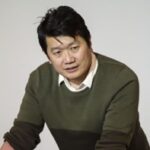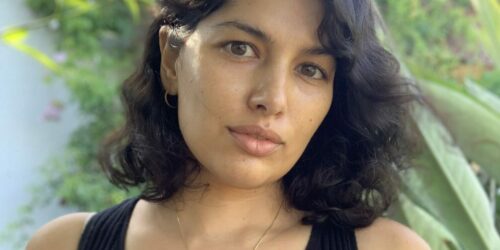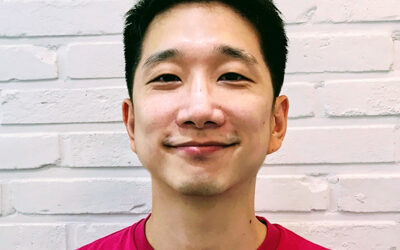
Queer science fiction writer Chi Ta-wei recently took part in a Chinese to English workshop led by Jeremy Tiang at the BCLT Summer School 2021. The workshop was generously supported by the National Museum of Taiwan Literature and the Cultural Division of Taipei Representative Office in the UK. Here, Jeremy and Ta-wei reflect on the experience of working collaboratively with ten translators on a translation of Ta-wei’s short story, ‘Breakfast’.
JT: The translator is said to be the closest reader of the text. How did you feel, spending the week in the company of ten translators reading your text so intimately? Did you make any discoveries about your own story returning to it so many years after you wrote it?
TC: When you asked me to choose a short text for the workshop, I chose ‘Breakfast’ because I had been curious how this viral flash story would look in a non-Chinese language.
I need critical distance from my own fiction — I feel self-conscious when my fiction is discussed by others. This avoidance partially explains why I have not written new fiction for many years: I simply forget that I used to write a lot and enjoy writing fiction.
I was totally surprised and delighted by our weeklong workshop. First, I did not know that I, with the idiosyncrasies of a loner, could work so closely and intensely with you and ten committed young translators on ‘Breakfast’. Usually, I would avoid such an occasion, but you and the translators simply made me stay with you in naturally disarming and encouraging ways. I think it was partly your elegant management of the team and partly the bonhomie from all of you.
Second, a natural consequence of the enjoyable experience is my increased trust of translators and myself. I presume many writers are so sensitive (a euphemism) that they are reluctant to trust translators or themselves in a more relaxed, comfortable fashion.
JT: During the week, you tweeted, ‘I feel like [I’m] in an operating theater, witnessing my old text in #Chinese being transformed, bit by bit, into a cyborg in #English. Bloody and fun.’ That’s a particularly striking image — the half-human, half-machine figure of the cyborg. What about our collective translation process evoked it?
TC: I could not stop associating my experience with anatomy, partly because these allusions are dominant in some science fiction, from Frankenstein to my own Membranes (recently translated by Ari Larissa Heinrich), and partly because anatomical metaphors are common in introductory courses to languages and literatures in many countries. I once visited an actual museum of an operating theatre in London, where the docent presented a dummy on a historic operating table, surrounded by children and their parents, much as we encircled ‘Breakfast’ in our workshop.
My distance from the text, our shared dummy, was ambivalent: as the author of the text, I might be presumed to be closer to the text than any of you; as translators, you however might hold scalpels more confidently and stably than I. I learnt to situate myself differently in relation to the text in different stages of our workshop.
‘As the author of the text, I might be presumed to be closer to the text than any of you; as translators, you however might hold scalpels more confidently and stably than I.’
JT: Donna Haraway tells us that ‘the cyborg is a creature in a post gender world.’ While the central couple of this story are caught in a ‘traditional’ heterosexual marriage, the figure of the lover remains ungendered in the translation as it does in the original. How do you feel this translation handled the elements of gender fluidity and queerness in your story?
TC: I was happily surprised that the group managed to keep the mysterious character in the story ungendered. Indeed, when the story was shared on social media in Taiwan and China, a major point of interest was this refusal to gender this character.
Whereas I agree that our teamwork made the story queer and post-gender in English too, I am more fascinated that we all emphasized how literature, unlike multimedia, could retain the sweetness of mysteries. As I am, like many of us, bombarded by multimedia, I really appreciate fiction in which I do not need to witness (and evaluate) the faces, bodies, and genders of characters, nor to hear (and evaluate) them.
JT: Unusually for the summer school, every member of the group, including the workshop leader, was a heritage speaker of Chinese who’d grown up bilingual. Do you think this had an effect on the translation process?
TC: I think this characteristic did make the workshop move efficiently without being distracted by too dramatic cultural differences. Our group was not monolithic but heterogeneous: from different countries, in different time zones. I was happy with that our group empowered the heritage users as translators.
JT: You’re an experienced translator yourself, with books by Italo Calvino, Manuel Puig and G.K. Chesterton under your belt. Did you find yourself thinking about your own translation practice during this week, and do you think the experience will affect the way you translate in the future?
TC: I have assumed the roles of translator, fiction writer, and academic researcher. I was motivated to translate many books to learn how to write fiction and conduct academic research from the translating processes. Since becoming a full-time academic researcher, I’ve found it virtually impossible to return to the roles of translator and fiction writer. If I could make time after my work at the uni, I would strategically choose fiction writing rather than translating. I think the experience at the workshop actually urges me to write more rather than translate more. I am happy to relieve myself from the task of the translator, for more and more Chinese-to-English and English-to-Chinese translators are emerging. I believe they will take care of translations more competently than I.
 Ta-wei Chi is a queer science fiction writer in Taipei. His science fiction novel on a post- transgender heroine, The Membranes, is already translated in Japanese, French and English. The English translation is forthcoming from Columbia University Press in 2011. Translations of his short stories are published on Words Without Borders, in Renditions: A Chinese-English Translation Magazine, and in Angelwings: Contemporary Queer Fiction from Taiwan. With a PhD in Comparative Literature at UCLA, he is associate professor of Taiwanese literature at National Chengchi University in Taipei, where he teaches LGBT studies and disability studies. Website
Ta-wei Chi is a queer science fiction writer in Taipei. His science fiction novel on a post- transgender heroine, The Membranes, is already translated in Japanese, French and English. The English translation is forthcoming from Columbia University Press in 2011. Translations of his short stories are published on Words Without Borders, in Renditions: A Chinese-English Translation Magazine, and in Angelwings: Contemporary Queer Fiction from Taiwan. With a PhD in Comparative Literature at UCLA, he is associate professor of Taiwanese literature at National Chengchi University in Taipei, where he teaches LGBT studies and disability studies. Website
 Jeremy Tiang is a fiction writer, playwright and translator from Chinese. His novel State of Emergency won the Singapore Literature Prize in 2018, and his short story collection It Never Rains on National Day was shortlisted for the same prize. He has translated novels by Yan Ge, Zhang Yueran, Yeng Pway Ngon, Chan Ho-Kei, Li Er and other writers across the sinophone world. His theatrical work includes Salesman之死, a bilingual riff on Death of a Salesman; A Dream of Red Pavilions, adapted from the novel by Cao Xueqin; and translations of plays by Chen Si’an, Wei Yu-Chia, and Zhan Jie. He lives in Flushing, New York, where he is a member of the literary translation collective Cedilla & Co. Image (c) Glenda Hydler Website
Jeremy Tiang is a fiction writer, playwright and translator from Chinese. His novel State of Emergency won the Singapore Literature Prize in 2018, and his short story collection It Never Rains on National Day was shortlisted for the same prize. He has translated novels by Yan Ge, Zhang Yueran, Yeng Pway Ngon, Chan Ho-Kei, Li Er and other writers across the sinophone world. His theatrical work includes Salesman之死, a bilingual riff on Death of a Salesman; A Dream of Red Pavilions, adapted from the novel by Cao Xueqin; and translations of plays by Chen Si’an, Wei Yu-Chia, and Zhan Jie. He lives in Flushing, New York, where he is a member of the literary translation collective Cedilla & Co. Image (c) Glenda Hydler Website
You may also like...
‘It’s a cliché, but there is an impossibility at the heart of translation’
Swedish author Golnaz Hashemzadeh Bonde in conversation with translator, poet and editor Elizabeth Clark Wessel

29th September 2020
‘This is what we do, as translators: we keep listening and we keep adapting’
Cypriot writer Constantia Soteriou in conversation with translator Lina Protopapa

24th September 2020
Translators Jeremy Tiang and Anton Hur in conversation
In conversation with Kate Griffin

11th September 2019






